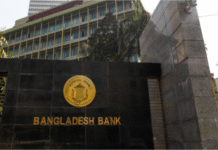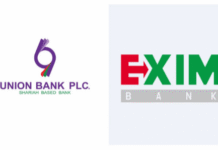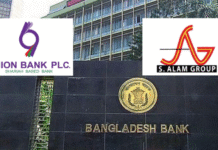The government yesterday increased prices of diesel and kerosene by Tk 7 a litre, and octane and petrol by Tk 5 a litre to reduce its subsidy burden.
The price of diesel and kerosene has been raised to Tk 68 a litre, and the prices of octane and petrol have been increased to Tk 99 and Tk 96 a litre, Nazmul Ahsan, a deputy secretary of the energy ministry, told The Daily Star.
The new prices take effect from today.
The government increased fuel prices by Tk 5 a litre the last time on December 30, 2011.
This is the first fuel price hike in the last one year. The Awami League-led government has so far increased fuel prices five times, including the latest one, since it came to power in December 2008.
Despite the latest increase, the government will have to give subsidy on diesel and kerosene by Tk 11.77 and Tk 12.15 a litre.
The latest rise will help the government, which plans to spend Tk 8,500 crore in fuel subsidies, save up to Tk 2,500 crore, said energy ministry officials.
They said the government raised fuel prices at retail level, as oil prices have remained high on the international market.
State-run Bangladesh Petroleum Corporation imports oil from the international market at higher prices and sell them at subsidised rates.
When the present government came to power four years ago, it had cut diesel and kerosene prices by Tk 2 a litre. And it did not raise fuel prices in 2010.
The government increased the prices of petroleum products four times in 2011, as it faced huge financial strains with the doubling of oil imports, partly due to costly quick-rental power plants.
In fiscal 2010-11 and 2011-12, the government offered credits and bonds worth Tk 12,549 crore in favour of BPC to buy petroleum products.
Though the government faced financial strains last year, it did not raise the prices considering the burden it would have on people at large, said officials.
In the current fiscal year, the government has already spent Tk 2,700 crore on fuel subsidies.
Officials said it would have been impossible for the government to continue its development spending if it had not increased fuel prices.
The government had hoped that oil prices on the global market would go down, and it would not be necessary to increase fuel prices, said another official at the energy ministry.
But the government had no alternative but to raise the prices, as it did not happen, said the official.
The price hike was expected, as the International Monetary Fund made the adjustment of fuel prices one of the conditions for the release of $140 million — the second instalment of its $1 billion credit to Bangladesh.
The IMF had asked the government to increase prices of petroleum products by Tk 10 per litre.
Source:The Daily Star










